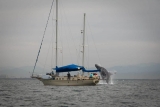A paradise in which one of the largest, unknown and amazing sea creatures inhabits None Reef, coral reef of almost 300 km in length, are the hunting ground of the whale shark (Rhincodon Typus), the Greater known escalo, the largest fish of all who inhabit sweet or salty waters of the earth.

From the air we already divided the formidable reef, a huge task performed by the fragile and tiny coral polyps. Slowly and patiently, with the passing of the centuries, the small invertebrate has been gaining a battle that seemed to have lost in advance building, in the ocean, a coral jungle that gives shelter thousands of other species, both animals and vegetables. Br />
a escualo that feeds on plankton
The giant among the giants is the blue whale, which exceeds thirty meters and reaches one hundred tons of weight. But both this and our protagonist, the whale shark, have been able to grow and develop thanks to the privileged conditions that exist in the sea for them: to feed on one of the most primary forms of life, the plankton , they place them very close to the base of the food chain. A predator, such as the white shark, needs a much greater mass of energy in its diet, when it is lost along the different food links. Our giants are undoubtedly optimizing energy consumption. Being great in the ocean represents the best solution to survive. The larger an organism, the less potential enemies it may have and more dams may be at your disposal. In addition, under water, large organisms are almost always more efficient when moving and spending less energy.

The Whale Shark, however, remains a mystery . Very few scientists have had the opportunity to locate him. Many have spent years immersions in tropical waters without ever having this meeting.
the whale shark: that great stranger
The whale shark is unknown almost everything, from the number of specimens that may exist for aspects of their biology, reproduction, migrations, etc. There is only a safe fact: nowhere is abundant. So, what is the reason that attracts these animal giants to any Reef during a certain season of the year?
Their arrival coincides with the reproduction of coral polyps. This occurs explosively during the month of February, and fertilized eggs invade the reef waters en masse. Millions of larvae enrich the water with nutrients, giving rise to a real soup that may well be attractive to filter feeders such as manta rays and whale sharks. In addition, two very different water currents converge in Ningaloo: one coming from the north, warm and crystal clear, which provides the excellent temperature, and another from the south, bringing cold waters rich in nutrients, guaranteeing a colossal mass of food. These currents are so well differentiated that, in just a few hundred meters, you can go from diving with visibility of about thirty meters to, suddenly, not being able to see beyond your own hands.

exmouth, the right place for the meeting
To live encounters with these marine animals, you must travel from March to May to a small town from the Australian northwest called Exmouth. To get to him it is necessary to reach Perth on any of the international flights that leave from Europe: Quantas, Tai, Brithis, Singapure, are some of the airlines that make this journey. Then we will fly in ANSET, stopping in Geraldton, Denham, Carnarvon, until we reach Exmouth. On the way we will have left very interesting places like Shark Bay: famous for the friendly Dolphins of Monkey Mia and the dugongos who inhabit this great Australian bay.
From Exmouth we can make fantastic immersions in the waters of none and on the island of Moorion, where tiger, hammer and whale sharks are also very abundant. Diving in these funds still wild is living endless emotions: in addition to all imaginable shades, the pelagic life is extraordinary.

Hearts of all kinds of fish, sea snakes, turtles, blankets, gigantic mere will accompany us in each immersion. The only objection that can be made are the changing water conditions by the tides and nutrients that exist in suspension. The union of these two factors will often cloud water, but they will compensate us with the great wealth they produce.













